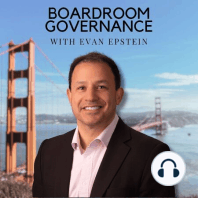2 min listen

Mason Morfit: "We Can Bring Peripheral Vision to the Boardroom."
Mason Morfit: "We Can Bring Peripheral Vision to the Boardroom."
ratings:
Length:
65 minutes
Released:
Oct 28, 2020
Format:
Podcast episode
Description
Start of interview [1:17]Mason's "origin story" [1:58]His start with ValueAct Capital (2001-Present) [2:51]"A lot of what we do at ValueAct is invite ourselves to the dinner party."The history of ValueAct Capital and its investment thesis. [6:20]How he met Jeffrey Ubben (founder of the firm).The impact of the corporate scandals in the early 2000s and the Martha Stewart story.Building a reputation as long term thinkers with board members that add value, plus network.How they built their "board toolkit" for each function of the board with lessons learned from their board experience (starting ~2010s) [11:21]"Our thesis is different to other activist investors who have built their businesses upon campaigns of intimidation, litigation and electioneering" [12:49]Framing ValueAct's activism style within the historical arch of shareholder activism. [14:01]"Engineers think in terms of optimization and equations, lawyers think in terms of rules, and liberal arts people think in terms of psychology, sociology, literature, etc - I think you need to take into account these three types of thinking for problems [involving corporations}"What happened after SOX (2002) was that the zeitgeist for boardrooms changed in terms of openness to receiving outside opinions.The Say on Pay (2011) rules forced greater interaction between directors and shareholders. [15:56]His thoughts on "systematic" boardroom design issues: "we should all have empathy for independent directors, because they're entrusted to make the most consequential decisions around the corporation and yet [they do it part-time and generally lack information]. It's a tough job to do." "We can bring "peripheral" vision to the boardroom, which is supplemental to what the board sees through their own hierarchy." [18:00]The problem with board committee structures and their independent consultants/advisors: "it drives to the balkanization of work." "There is an under-investment in terms of time devoted to strategy [in the boardroom]" [20:11]"Thinking like an investor with an investment thesis is a very crystallizing thought exercise. It will lead you to have a point of view about what the strategy should be" "It's an important ingredient to being a good director." [23:33]How should boards approach strategy, and why the job of the director is so hard (i.e. lack of time and information) [24:51]How does he respond to criticism of activist investors as a class [27:49] "some of these criticisms are fair." He thinks that it's important to note that shareholder activism (during his career) has had two big bubbles that popped:Surge of activism after SOX, popping after the financial crisis because they didn't perform very well.Resurgence after credit crisis, popping in the mid 2010s.How advisors (lawyers, bankers, and others) impacted the activism landscape [29:50] "activist vulnerability assessments"How he distinguishes transactional vs transformational activism [30:45]Transactional: Traditional break-up, recap and selling of companies.Transformational: reimagining the value proposition of the product of the company. Best in class people and operational performance. It requires a lot more work (they started this practice in the mid-2000s).The mission statement of ValueAct since he took over as CEO is "to be the shareholder of choice for great companies navigating change." [33:16] Examples:Adobe, Microsoft (from client service era to cloud era in software industry)21st Century Fox (streaming in media companies)KKR (alternative asset management industry)What he loves about his job [34:46]Advice for independent directors: [35:29}Activism is everywhere (not just from activist investors)Peripheral vision can be helpful, and thinking critically with an investment thesis adds value.We live in an era of extreme disruption in the economy.Transformation is a critical journey for every company.His experience as a director at Microsoft [37:08]His take on the purpose of the corporation, ESG and sustainability [
Released:
Oct 28, 2020
Format:
Podcast episode
Titles in the series (100)
Introducing Boardroom Governance with Evan Epstein: Welcome to the Boardroom Governance podcast! In this short track, I introduce myself and describe the premise/format of the show. It's pretty simple: this is an in-depth interview podcast to learn from some of the top corporate governance experts, including world-class founders, scholars, board members, executives, investors and more. Thank you for tuning-in, and I encourage you to subscribe to this podcast if you're interested in corporate governance, board-related matters, or leadership generally. You can find all the details of this show at www.boardroom-governance.com by Boardroom Governance with Evan Epstein